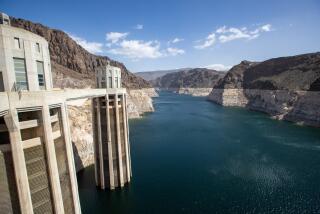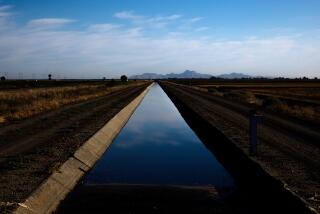Water and the Water Cycle
- Share via
Wonder where clouds come from? Or why it rains? Or where rivers and streams begin? The water cycle is a dynamic process that answers all of these questions! Find out how the delicate balance of life on Earth depends on these phenomena. Use these direct links on the Times Launch Point Web site: https://www.latimes.com/launchpoint.
Here are the best sites for getting your schoolwork done or for just having fun.
Level 1
Wonderful Water--The Water Cycle: All living things must have water. This Web site has colorful pictures and descriptions of the parts of the water cycle. Try some activities in which you measure how much water your home or school uses in a week.
https://www.wrc.govt.nz/ws/ww/twc.htm
Mr. Leaky Activity Book: About 71% of the Earth’s surface is covered by water, and the human body is 65% water. Learn about the water cycle and ways you can conserve water.
https://www.sawwa.org/leaky.htm
Science Court: The Water Cycle: Is there water in air? Help Judge Stone and the Science Court decide whether Mr. Peterson’s pipes are leaking. Find out how to make it rain in your kitchen.
https://www.teachtsp.com/classroom/scicourt/watercycle.html
Level 2
The Evergreen Project--What’s It Like Where You Live? Although most of the Earth is covered with water, only about 1% of the planet’s water supply is usable by people and animals. Find out about the scientific processes involved in the water cycle and explore freshwater ecosystems.
https://mbgnet.mobot.org/fresh/index.htm
USGS Water Science for Schools: Whether you are wondering why the ocean is salty or what exactly acid rain is, this site explains many features about water. View maps that show U.S. water use, try some investigative activities and follow a drop of water as it travels through the cycle.
https://ga.water.usgs.gov/edu/index.html
The Hydrologic/Water Cycle: Water is unique in that it easily changes form from solid to liquid to vapor. Try some activities to explore water use and to understand how water is distributed on the Earth.
https://www.und.nodak.edu/instruct/eng/fkarner/pages/cycle.htm
Level 3
All About Water: What is the difference between surface water and ground water? What methods are used for making water safe to drink? Learn about water treatment, conservation and the first water supply systems of the ancient Egyptians and Romans.
https://www.sawwa.org/allabout.htm
The Natural Water Cycle: The water cycle is influenced by human activity. Compare the differences between a traditional community water system and a sustainable community water system.
https://www.waitakere.govt.nz/ecocity/waternet/index.htm
Environment Canada: Discover the importance of water through this site, which not only discusses the nature of water but also different systems of water management, international water policy and legislation and how water has influenced Canadian art and culture.
https://www.ec.gc.ca/water/e_main.html
Launch Point is produced by the UC Irvine department of education, which reviews each site for appropriateness and quality. Even so, parents should supervise their children’s use of the Internet. This week’s column was designed by Valerie M. Thompson, Carolyn A. Mendonca, Janine Boleda and Anna Manring.
EXPLORER’S QUEST
The answer to this Internet quiz can be found in the sites at right.
What six processes make up the water cycle?
CLUE: See The Evergreen Project--What’s It Like Where You Live?
Find What You Need to Know: Have a project on California history? Need help doing a math problem? Launch Point now covers more than 100 topics for getting your schoolwork done. Go to https://www.latimes.com/launchpoint/ for the full list of subjects and direct links to the best Internet sites.
Answer to last week’s Quest: Women’s rights activists Susan B. Anthony and Elizabeth Cady Stanton did not live to see the passage of the 19th Amendment.





